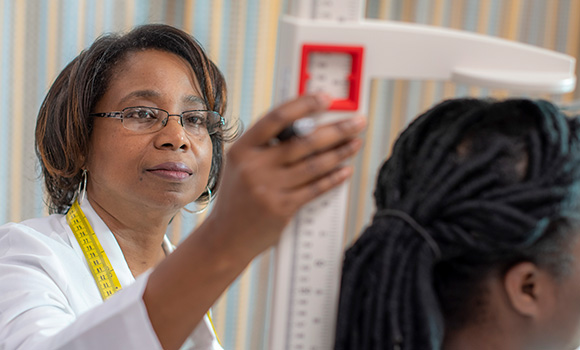This post originally appeared in UNCG Research Magazine. To read other stories about research, scholarship, and creative activity, visit researchmagazine.uncg.edu.
Stephanie Pickett saw many patients with end-stage renal failure while working as a nurse at Duke University Medical Center in vascular radiology. A large portion of those patients were African American.
“It was very striking,” says Dr. Pickett, now an assistant professor in nursing. “They had lost kidney function due to diabetes or high blood pressure. It moved me to want to do something about it.”
She went back to school, becoming a nurse practitioner and ultimately earning her PhD. Now she conducts research examining cardiovascular risk factors, with a particular interest in obesity and obesity-related chronic illnesses among young African American women.
“Fifty-seven percent of African American women between 20 and 39 are obese, compared to 33 percent of white women,” Pickett says. “Excess weight is a major risk factor for cardiovascular disease.”
While many scientists look at behaviors leading to obesity, Pickett has taken a different tack. A large section of her research has focused on beliefs people have concerning their weight and overall health, and the impact of those beliefs.
Rosalind Peters, a fellow of the American Academy of Nursing who chaired Pickett’s doctoral committee, says her research has filled a gap in the field.
“She realized no one had developed a scale about one’s beliefs about personal weight,” Dr. Peters says. “There were scales about what people believed about obesity in general, but there were no scales that measured what people believe regarding the causes and consequences of their own weight.”
Pickett found that culturally-related beliefs about personal weight affect eating behaviors and body mass index. African American women who pointed to life circumstances and other factors out of their control as the cause of their weight, for example, were more likely to be obese.
“Surveys on beliefs about personal weight should be used as a component of weight management interventions,” she says.
More recently, Pickett has looked at stress, emotions, and eating patterns among young African American women. She found perceived stress and depression are significantly associated with emotional eating, sweet snacking, and haphazard meal planning. These findings, she says, have important clinical implications. When African American women say they are stressed or depressed, providers may need to ask more specific questions about food habits.
In her latest project, Pickett is taking hair samples to look at chronic stress and psychosocial factors associated with eating behaviors.
“Chronic stress can be measured by looking at cortisol in hair samples. Hair grows about one centimeter a month, and we’re taking three centimeters,” she says. “This allows us to compare physical indicators of stress over three months with the results of questionnaires asking about stress and emotions.”
In addition to helping prevent weight issues, Pickett said she would like for her research to create increased awareness of health concerns in African American communities.
“This is an opportunity to put a spotlight on certain problems that African Americans have, like chronic stress, and how they can negatively impact health long term,” she says. “And it’s an opportunity to develop interventions that have an impact.”
Story by Robert Lopez
Photography by Martin W. Kane, University Communications



